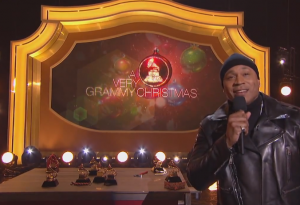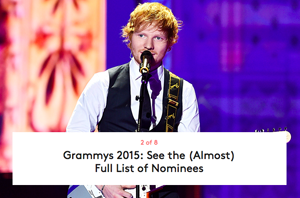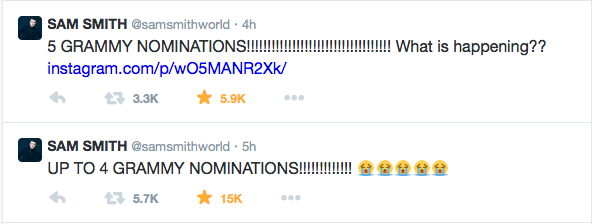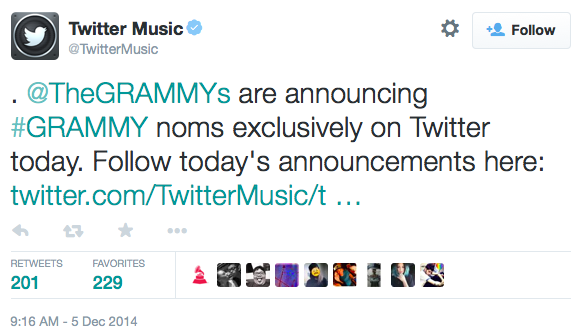And the Grammy Nominees are [On Twitter]…
As viewing patterns have shifted dramatically over the past two decades, fragmenting audiences and delaying viewing in what we characterize as a post-network era, the televised award show has increased in value for broadcast networks. Live events work against delays, provide the possibility for social media buzz, and speak to a presumed broad audience that is becoming increasingly more difficult to capture with traditional programming. This has made the relative value of award shows increase, both for major awards (the Oscars, the Emmys, the Grammys) in respective media and lesser award shows that now have greater value than when they were perceived as illegitimate offshoots of the more reputable awards in said medium (such as the American Music Awards and the Billboard Music Awards, which are based on fan voting and record sales respectively).
 Outside of isolated moments like Ellen Degeneres’ “Oscar Selfie,” however, major award shows in film and television have not necessarily changed their approach in light of their new value in a convergent media era, remaining largely the same in terms of flow and structure. By comparison, the Grammy Awards have gone through a tremendous overhaul, dramatically altering the number of awards presented during the televised ceremony, and shifting to a more substantial number of performances. While the presence of performances has always been a key draw for the Grammy Awards, the increase in the number of performances—going from 8 in 2004 to 20 in 2014—has shifted the ceremony further toward the live event spectacle that cuts through the challenges of broadcast television so effectively in the current moment. CBS has even built on its success with a yearly concert special timed to the Grammy nominations in December, announcing the nominees for “Album of the Year” and other major categories as part of a concert “preview”—this year with a holiday theme—of the January or February ceremony before releasing the full list.
Outside of isolated moments like Ellen Degeneres’ “Oscar Selfie,” however, major award shows in film and television have not necessarily changed their approach in light of their new value in a convergent media era, remaining largely the same in terms of flow and structure. By comparison, the Grammy Awards have gone through a tremendous overhaul, dramatically altering the number of awards presented during the televised ceremony, and shifting to a more substantial number of performances. While the presence of performances has always been a key draw for the Grammy Awards, the increase in the number of performances—going from 8 in 2004 to 20 in 2014—has shifted the ceremony further toward the live event spectacle that cuts through the challenges of broadcast television so effectively in the current moment. CBS has even built on its success with a yearly concert special timed to the Grammy nominations in December, announcing the nominees for “Album of the Year” and other major categories as part of a concert “preview”—this year with a holiday theme—of the January or February ceremony before releasing the full list.
If the changes to the Grammy ceremony itself reflect shifts in audience viewing patterns within traditional media, the strategy the Recording Academy is using to reveal this year’s nominees represents a more dramatic move away from traditional media. The release of award nominations has historically been handled through early-morning press conferences, wherein professionals within the respective field teams up with the Academy president to reveal major nominations ahead of the release of the full list of nominees shortly after. These take place at roughly 5:30am in Los Angeles, a time chosen in order to coordinate with the morning shows on the East Coast, with the nominations typically simulcast by one or more of them. It is an old tradition that has adjusted to include livestreaming, and that the Grammys has shifted to Primetime in recent years, but it remains predominantly tethered to an old media stalwart.
Congrats to @theGRAMMYs Song Of The Year noms @Meghan_Trainor, @sia, @taylorswift13, @samsmithworld & @hozier! <3 https://t.co/xqncX3LrSb
— Troye Sivan (@troyesivan) December 5, 2014
This year, however, the Recording Academy partnered with Twitter to reveal the majority of the nominees for this year’s awards one-by-one over the course of the day: although anchored by nominees Ed Sheeran and Pharrell on CBS This Morning and the Album of the Year reveal on the CBS nominations special, therefore retaining a tie to traditional broadcast environments, the partnership with Twitter is where the vast majority of discourse around the awards circulated today. Whereas all award shows are now actively engaged in social media, tweeting congratulations to nominees in hopes of retweets and further follows, the Grammys are not simply tweeting the nominees from their own account (which has 1.7 million followers): instead, they have parceled out the categories among a number of former winners or contemporaries in respective categories (Vampire Weekend, Joy Williams, Mark Ronson), prominent YouTube stars with musical aspirations and strong social media followings (Troye Silvan), syndicated entertainment shows or personalities (Ryan Seacrest, Access Hollywood, The Insider), and perennial Grammys host LL Cool J, among others—I’ve collected a Storify of most of them here. With most using the integrated video function on Twitter, and with each video including a plug for the Emmy Award ceremony on CBS in February, the videos serve to make the nominations themselves visible to a broader audience, suggesting a careful curation of “presenters” and potential audiences across various genres.
 It’s a decision that has confounded the traditional way nominations are covered in the entertainment industry: whereas journalists can typically speak to narratives in the awards, sites are now forced to gradually collect and collate information, building narratives—who has the most nominations, who was snubbed in certain categories—on the fly with only limited perspective until the majority of nominees (all but album of the year) were finally posted around 2pm ET. Beyoncé’s single announced nomination early in the day allowed her to pass Dolly Parton to become the most nominated female artist of all time, but anyone who ran that story needed to update it to reflect her final nomination count, which will remain unclear until tonight’s broadcast. Sam Smith tweeted about earning four nominations before getting out of bed, but that number increased shortly after, necessitating another message updating the number to five.
It’s a decision that has confounded the traditional way nominations are covered in the entertainment industry: whereas journalists can typically speak to narratives in the awards, sites are now forced to gradually collect and collate information, building narratives—who has the most nominations, who was snubbed in certain categories—on the fly with only limited perspective until the majority of nominees (all but album of the year) were finally posted around 2pm ET. Beyoncé’s single announced nomination early in the day allowed her to pass Dolly Parton to become the most nominated female artist of all time, but anyone who ran that story needed to update it to reflect her final nomination count, which will remain unclear until tonight’s broadcast. Sam Smith tweeted about earning four nominations before getting out of bed, but that number increased shortly after, necessitating another message updating the number to five.
 The presence of social media has privileged live events because they are something people “talk about,” and have the potential to spread beyond their initial viewing audience as online buzz pushes people to tune in. In this case, the Grammys are tapping into the same potential for social media to spread word about the nominations, creating an environment where it is impossible for anyone engaged with entertainment journalists or musicians on Twitter to avoid Grammys reporting over the course of the day as artists and outlets livetweet their reactions to the nominations rollout. Whereas “Oscar Nominations Morning” has become a tradition in the context of social media, with Twitter and other social media conversations focused on what is considered a major industry event, the Grammys have sought to claim an entire day, an effort that shows how the adoption of social media is influencing established spaces of industry practice.
The presence of social media has privileged live events because they are something people “talk about,” and have the potential to spread beyond their initial viewing audience as online buzz pushes people to tune in. In this case, the Grammys are tapping into the same potential for social media to spread word about the nominations, creating an environment where it is impossible for anyone engaged with entertainment journalists or musicians on Twitter to avoid Grammys reporting over the course of the day as artists and outlets livetweet their reactions to the nominations rollout. Whereas “Oscar Nominations Morning” has become a tradition in the context of social media, with Twitter and other social media conversations focused on what is considered a major industry event, the Grammys have sought to claim an entire day, an effort that shows how the adoption of social media is influencing established spaces of industry practice.
It is also an additional reminder that while who wins or is nominated for awards remains a key space of analysis for engaging with the place of awards in media industries and in culture more broadly, the process by which those nominees are determined or announced is equally central to the award show’s place within contemporary media studies.



